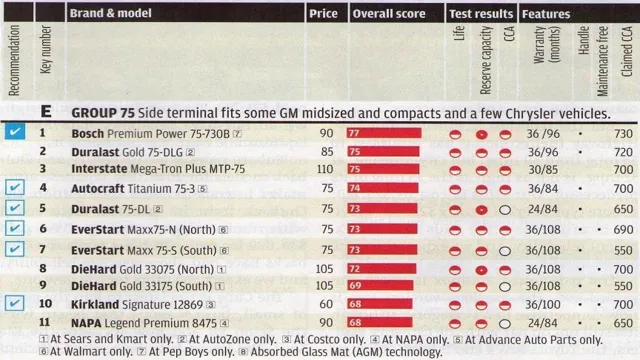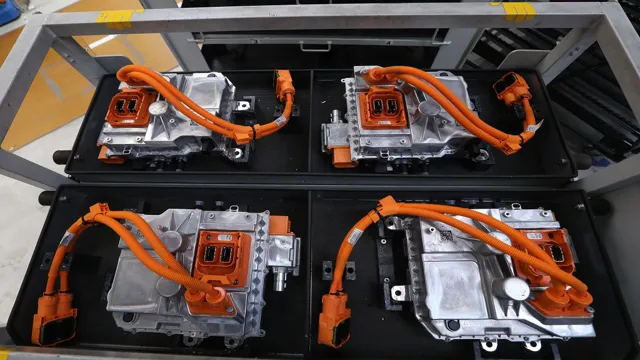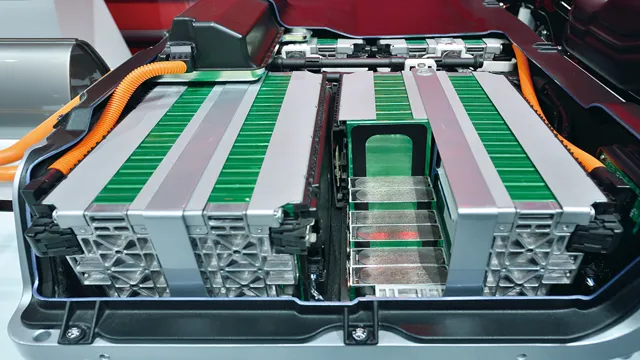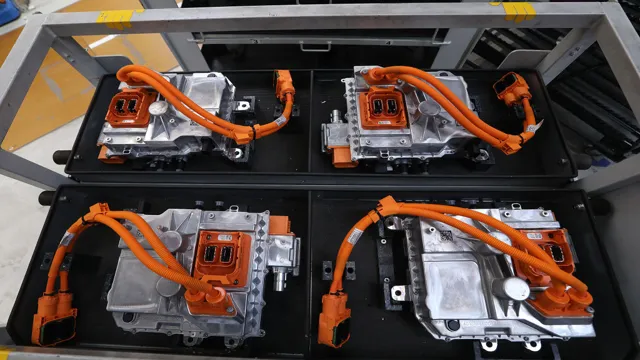Revving Up Your Knowledge: Ranking and Reviewing the Best Electric Car Batteries
Electric vehicles have catapulted into the mainstream as a viable transportation option, but as with any new technology, there are still some lingering questions. One of the main queries people have is about electric car battery rating. How does it work? What does it mean? And, most importantly, how does it affect the vehicle’s performance and cost? With so many factors at play, it can be overwhelming to navigate the world of EV batteries.
In this blog, we’ll break down everything you need to know about electric car battery ratings, so you can be informed and confident in your decision to switch to a greener mode of transportation.
What is Battery Rating?
Electric car battery rating refers to the performance metrics that are used to determine the quality of the battery. These ratings indicate how long the battery can sustain its charge and how far the vehicle can travel before it needs to be recharged again. The battery rating is typically measured in kilowatt-hours, which is the amount of energy the battery can store.
The higher the rating, the longer and more efficient the battery is. For instance, a battery with a higher rating can power an electric car for longer distances. So, if you are searching for an electric vehicle, it is crucial to consider the battery rating and opt for the best you can afford.
Explaining battery rating and its importance in electric cars
Battery rating is a crucial aspect of electric cars that determines the driving range and performance. It is defined as the measure of the capacity of a battery to store and deliver electrical energy. Battery rating is usually expressed in kilowatt-hours (kWh), indicating the amount of energy that can be discharged from the battery in one hour.
The battery rating is essential in ensuring that the car can travel the desired distance without running out of power. The higher the battery rating, the longer the range of the car. For instance, a car with a battery rating of 60 kWh can travel farther than a car with a rating of 40 kWh.
Besides, battery rating affects the charging time and acceleration of the car, making it an essential factor to consider when purchasing an electric vehicle. We all know that it is not pleasant to run out of battery on your way to somewhere, so make sure to pay attention to the battery rating if you plan to buy an electric car.
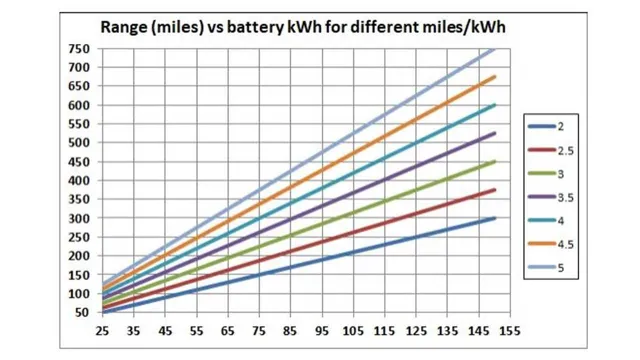
Types of Battery Ratings
When it comes to electric car battery ratings, there are a few different types to understand. The first is the capacity rating, which is measured in kilowatt-hours (kWh) and represents the amount of energy a battery can store. This rating will impact how far an electric car can travel on a single charge.
Another important rating is the power rating, measured in kilowatts (kW). This rating determines how much power the battery can deliver at any given moment, affecting the car’s acceleration and top speed. Lastly, there is the cycle life rating, which represents the number of times a battery can be charged and discharged before it begins to degrade significantly.
Understanding these different types of ratings is crucial when purchasing an electric car and choosing the right battery for your needs. So if you’re in the market for an electric vehicle, be sure to pay attention to these important battery ratings.
Comparing energy and power ratings and their effects on electric cars
When it comes to electric cars, understanding the various battery ratings is crucial. One type of rating is energy capacity, which measures the amount of energy a battery can store. This is typically measured in kilowatt-hours (kWh) and is an important factor in determining how far an electric car can travel on a single charge.
Another type of rating is power output, which measures how much energy a battery can deliver at any given moment. This is typically measured in kilowatts (kW) and is important for determining acceleration and overall performance. While both ratings are important, they can have different effects on electric cars.
A car with a higher energy capacity may have a longer range, but may not have the same level of acceleration as a car with a higher power output. Similarly, a car with a higher power output may have better acceleration, but may not be able to travel as far on a single charge. It’s important to consider both energy and power ratings when choosing an electric car that fits your needs.
Understanding charge and discharge ratings and how they affect battery life
When it comes to batteries, there are different types of ratings to consider, including charge and discharge ratings. Charge rating refers to the amount of current that can be safely applied to the battery during charging, while discharge rating refers to the amount of current that can be safely drawn from the battery during use. These ratings are crucial in determining the battery’s lifespan and overall performance.
Overcharging a battery can lead to damage and reduce its lifespan, while discharging a battery beyond its recommended limit can cause it to fail. It’s essential to understand a battery’s charge and discharge ratings to ensure its longevity and optimal usage. Choosing the right charger and using it correctly will help you maintain your battery’s performance and extend its lifespan.
Overall, understanding battery ratings will help you make informed decisions when choosing or using a battery.
Factors Affecting Battery Rating
When it comes to determining the rating of an electric car battery, there are several factors that come into play. One of the most significant factors is the battery’s capacity, which refers to how much energy it can store. Another important consideration is the battery chemistry, which can significantly impact the battery’s performance and longevity.
Additionally, the age of the battery and the environment in which it is used can also affect its rating. For example, extreme temperatures can cause a battery to degrade more quickly, leading to a lower rating. Ultimately, the rating of an electric car battery is a measure of its overall performance and is an essential consideration when it comes to choosing a vehicle and planning for long trips.
So, it’s crucial to look for a battery with a high rating, strong capacity, and a chemistry that suits your specific needs.
Temperature, driving style, and charging habits and their impact on battery performance
One of the biggest factors that affects the rating of an electric vehicle battery is temperature. Extreme temperatures, both hot and cold, can significantly impact the performance and lifespan of a battery. In hotter climates, the battery may lose its capacity quicker than in cooler climates.
Similarly, very cold temperatures can reduce the efficiency of the battery and decrease the range of an electric vehicle. Another factor that affects battery rating is driving style. Aggressive driving that involves frequent and abrupt acceleration and braking can put stress on the battery, reducing its overall life span.
Lastly, charging habits can also impact battery performance. Overcharging or frequently charging to full capacity can lead to premature battery deterioration, while undercharging can decrease the range of an electric vehicle. Therefore, it’s important to consider these factors when owning an electric vehicle to optimize the performance and lifespan of the battery.
Why battery rating varies based on the model and make of electric car
When it comes to electric cars, the battery rating can vary quite drastically based on the specific make and model of the vehicle. There are a number of different factors that can impact the battery rating of an electric car. For starters, the size and capacity of the battery play a significant role in determining the rating.
Additionally, the design and layout of the car can impact how efficiently the battery is used, which also affects the final rating. Other factors that can come into play include the weight of the vehicle, as well as the type of driving that the car is designed for. Ultimately, the technology and engineering behind each electric car can vary quite a bit, which is why it’s important to do your research when considering a new electric vehicle.
This will help you find a model that fits your needs and offers the battery rating and overall performance that you’re looking for.
Battery Rating Comparison
Electric car battery ratings play a crucial role in determining the driving range and overall performance of an electric vehicle. The rating of a battery is typically measured in kilowatt-hours (kWh) and represents the amount of energy that can be stored in the battery pack. Generally, the higher the kWh rating of the battery, the longer the vehicle can travel on a single charge.
For example, an EV with a 60 kWh battery might be able to drive up to 230 miles on a single charge, while a vehicle with a 100 kWh battery could travel up to 350 miles before requiring a recharge. However, it’s important to keep in mind that battery rating is just one factor that contributes to an electric vehicle’s range and performance. Other factors like driving habits, temperature, and terrain can also impact the overall range of an EV.
Thus, it’s crucial to consider multiple factors when choosing an electric car to ensure you get the best possible performance and range.
Top electric car models and their battery rating comparison
Electric car models have come a long way in recent years, providing eco-conscious drivers with a variety of options to choose from. One of the most important features to consider when selecting an electric car is the battery rating, which indicates how far the car can travel on a single charge. The Tesla Model S currently tops the list with a battery rating of up to 402 miles, followed closely by the Tesla Model X with a range of up to 371 miles.
The Porsche Taycan is also a strong contender, with a battery rating of up to 282 miles. Other electric cars with impressive battery ratings include the Audi E-Tron with a range of up to 222 miles, the Chevrolet Bolt with a range of up to 259 miles, and the Nissan Leaf with a range of up to 150 miles. When comparing electric cars, it’s important to consider not only the battery rating but also factors such as price, charging time, and additional features.
By doing so, you can find the best electric car for your needs and join the growing community of eco-friendly drivers on the road.
Graphical representation of popular electric cars and their battery rating
When it comes to electric cars, one of the most important factors to consider is the battery rating. This is essentially a measure of how much energy the car’s battery can store, and it can have a big impact on your driving range, charging times, and overall performance. To help you compare different electric cars and their battery ratings, we’ve put together a handy graphical representation.
This chart shows the battery ratings for some of the most popular electric cars on the market, including the Tesla Model S, Nissan Leaf, and Chevy Bolt. By looking at this chart, you can get a better sense of how these cars stack up against each other, and which one might be the best fit for your needs. So if you’re in the market for an electric car, be sure to take a look at this chart and see how the different models compare in terms of battery rating.
Conclusion
In the world of electric cars, battery rating is the name of the game. From kilowatt-hours to charging speed, it’s all about finding the perfect balance between power and efficiency. And while debates over range anxiety and charging infrastructure may continue, one thing is clear: electric cars are here to stay.
So if you’re in the market for a new ride, don’t forget to check the battery rating – because when it comes to driving green, it’s the juice that makes all the difference.”
Importance of battery rating in electric cars and how it influences overall performance
As electric cars become increasingly popular, the battery rating is becoming more important than ever before. The battery rating is essentially a measure of the amount of energy stored in the battery. A higher rating means more energy, which translates into longer driving range and better overall performance.
For example, a car with a 100 kWh battery rating will have a longer driving range than a car with a 50 kWh battery rating. Additionally, a higher battery rating means the car can accelerate faster and perform better. It’s important to compare battery ratings when considering purchasing an electric car.
You may find that a slightly higher upfront cost for a car with a better battery rating can actually save you money in the long run by reducing the need for charging and improving the overall performance of the car.
FAQs
What is meant by electric car battery rating?
Electric car battery rating is a measure of the battery’s output and capability to deliver power to the vehicle’s motor. It is usually expressed in kilowatt-hours (kWh).
How does electric car battery rating affect the driving range of the vehicle?
The higher the battery rating, the greater the driving range of the electric car. This is because a battery with a higher rating has more energy stored in it, allowing the vehicle to travel farther on a single charge.
What factors affect the electric car battery rating?
The battery rating can be affected by various factors, such as the type of battery used, its chemistry, manufacturing techniques, and the weather conditions. These factors impact the battery’s performance and its ability to maintain its rating over time.
Is it possible to upgrade the battery rating of an electric car?
Yes, some electric car manufacturers offer battery upgrades that can increase the battery rating and provide a longer driving range. However, the upgrade can be expensive and may not be applicable to all electric car models. It’s always recommended to check with the manufacturer before proceeding with a battery upgrade.

